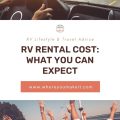Hey! This site is reader-supported and we earn commissions if you purchase products from retailers after clicking on a link from our site.
Any RV enthusiast will tell you that there’s nothing like spending an extended period roaming the country on your rig. This travel method offers a unique and flexible way to enjoy the great outdoors, which is why it’s no surprise that RVs are becoming more and more popular.
But handling the logistics of long-term RV rental can be overwhelming. How do you find the best prices? What are the average costs? Is renting the right option for you, or should you consider buying? To help you get your bearings, I’m going to answer all these questions and more in this guide to long-term RV rentals. Keep reading to find out everything you need to know.
Table of Contents
- Why Should You Rent an RV Long-Term or Monthly?
- Which is More Economical: Renting or Owning an RV?
- Where to Find Monthly RV Rentals
- What Are the Average Monthly RV Rental Costs?
- Other Long-Term RV Rental Tips
- Final Thoughts
Why Should You Rent an RV Long-Term or Monthly?
The first question to ask yourself is whether long-term RV rental makes sense for you. You may be unsure whether to choose an RV or another accommodation type, like hotels or even camping. So let’s take a look at some of the reasons people choose to rent RVs.
RVs Make Travel Easier
RVs offer several distinct advantages for anyone who plans to be on the road for extended periods because you are essentially taking your home with you. They give you and your family:
- A place for several people to sleep
- An area to cook your own meals
- Privacy
- Room for leisure activities
- The ability to carry as much stuff as you need
- An ideal setting for togetherness and bonding
RVs Solve Common Travel Issues
Additionally, RVs solve issues that many Americans face when going on vacation – some of which can even prevent or discourage you from going on your dream trip. When you travel by RV, you don’t have to deal with:
- Cramped cars and having to stop for frequent bathroom breaks
- The inconvenience of setting up tents and sleeping on air mattresses
- Expensive air travel
- Scheduling conflicts. With an RV, you are free from airline schedules and can travel at your own pace.
- Finding and paying for restaurants
- Paying for expensive hotel rooms. Even cheaper hotels or motels rarely cost less than $100 per night, an expense that adds up quickly. Most families cannot afford this cost long-term.
- Worrying about social distancing. Most travel has become incredibly difficult in the era of COVID, but keeping your distance from others is easy with RVs. You can cook, eat, sightsee, and sleep without worrying about crowds or sitting next to strangers on planes.
Which is More Economical: Renting or Owning an RV?
The cost of owning an RV adds up quickly. First, you have to pay for the vehicle itself. Then there is the price of maintenance and storage fees, property taxes, and the essentials that make life on the road comfortable – like generators, a sewer hose, toilet chemicals, and gas cans.
It’s easy to see that deciding to purchase an RV represents a significant, long-term investment – and many people choose to rent for this very reason. You can take advantage of all the wonderful things about RV travel without the financial commitment or hassle of maintenance.
Renting is also advantageous for anyone considering purchasing an RV, as it’s an excellent way to see if the lifestyle is right for you. And if you’re unsure of which model to choose, you can try several models to help you decide which one you like best.
Where to Find Monthly RV Rentals
You may be thinking, “All these advantages sound fantastic. But where do I find an RV to rent?”
Securing a rental is easier than you might think, thanks to peer-to-peer rental platforms. Users can rent from owners in their area who aren’t using their RVs, and the platforms make it easy to find what you’re looking for. Search by RV model, price, number of sleepers, and travel dates.
Listings also include information about amenities, like whether the RV has:
- Air conditioning
- A TV
- Bedding
- Kitchen utensils
- A microwave
Of course, there are usually lots of pictures of both the interior and exterior of the vehicle. And like on sites such as AirBnB, these platforms feature reviews from other renters. Reviews can help you get an idea of whether the RV is a good fit and gauge the trustworthiness of the owners.
Let’s take a closer look at two of the most popular peer-to-peer rental platforms, Outdoorsy and RVShare. I wouldn’t recommend using more traditional RV rental services like Cruise America or El Monte for monthly rentals.
Outdoorsy
Outdoorsy features the largest selection of RV rentals in the world. Pretty much anything you can think of, you can find on this platform, from luxury RVs to cheap ones, toy hauler rentals, travel trailer rentals, motorhome rentals, and more.
The site is filled with trusted owners, and users can book online from the comfort of their own home without the need for calls or office visits. Some other features that make Outdoorsy one of the best platforms is that they offer free roadside assistance with every rental and up to $1 million in insurance.
I personally like that Outdoorsy’s customer service is typically quite good, though most people rarely run into issues.
RVShare
RVShare is another popular peer-to-peer platform, and it’s very similar to Outdoorsy. However, it does have one key difference in that RV dealerships can list their inventory for rent. Some people prefer this option, which is more expensive, but allows you to rent nicer, newer RVs.
What Are the Average Monthly RV Rental Costs?
Now it’s time to address the question you’re probably most curious to answer: how much does a long-term RV rental costs?
The average monthly cost depends on many variables. Prices fluctuate depending on the type of RV you want to rent, whether it’s peak season, and the demand for these vehicles in your area. Your ability to negotiate can also swing the price.
But, in general, rental prices range from $50 to $200 per night. When compared to motels, the cost may seem expensive, but it’s often comparable – especially if you have a large family that would need more than one hotel room.
Another thing to keep in mind is that the longer you rent, the more the price will go down. Generally speaking, RV owners prefer to rent long-term, as renting to one family for a month requires much less effort than renting to four different families for a week each. You can use long rental times as a negotiating point.
Other Long-Term RV Rental Tips
Let’s wrap things up with a few tips to help you get the best deal.
Book Early
The sooner you secure your RV, the better chance you have of getting the rate you want. This tip is especially critical if you know you’ll be traveling in the high season. If you’re looking before there is high demand, it’s easier to negotiate a more favorable price.
Travel in the Off-Season
While not ideal for everyone, traveling in the off-season is a fantastic way to slash costs. Prices in the winter and shoulder months are always more economical, and you can enjoy changing landscapes.
Negotiate
If this is your first time searching for a long-term RV rental, it’s vital to be aware that negotiation is a part of the game. As I mentioned, RV owners want to rent their rig for as long as possible, which means they’re willing to negotiate things like the price, max miles allowed per day, the cleaning fee, and generator time.
Get an RV Campground Membership
Campground fees represent a significant portion of the costs associated with RV travel, but thankfully, RV campground memberships can help you pay less. I recommend checking out Passport America, which offers the best savings. They have discounts at nearly two thousand locations, where your membership can get you up to fifty percent off. Brian also really likes Harvest Hosts.
Boondock When Possible
Boondocking refers to the practice of staying on public property with no facilities. It’s also referred to as “dry camping,” as you won’t have water or electric hookups.
But what you lack in amenities, you make up for in not having to pay campground fees and getting to enjoy pristine places, such as beaches or forests. There are also opportunities to boondock at locations you wouldn’t associate with RV camping, such as wineries, farms, or golf courses.
Boondocking occurs on private property, as well. Local people (especially farmers) sometimes allow RV owners to park on their land. Aside from being an economic way to travel, boondocking on private property is an excellent way to meet people and make your trip more fun. Many hosts are even willing to give good intel about what to do in the area.
Final Thoughts
I hope you found this post useful and that you now have all the relevant information you need to get the best deal. As you can see, there are a lot of factors to consider when searching for the perfect long-term RV rental. However, the hassle is worth it to travel on your own terms and be able to enjoy the open road with your loved ones.
Here’s wishing you safe and happy travels!




